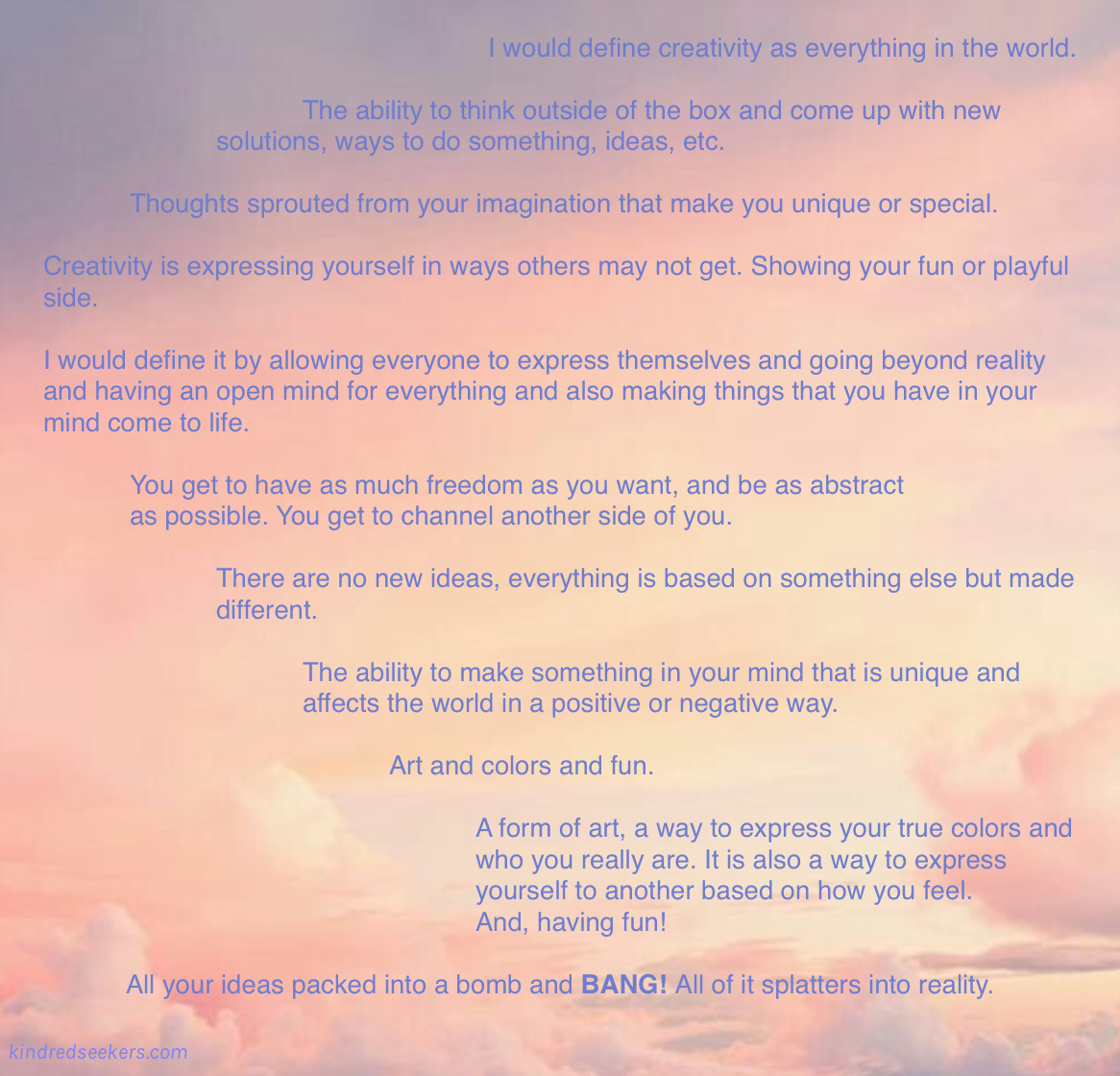What Small Humans Can Teach Us Big Idiots About the Important $#!&
I guess I'm a rogue teacher. The prevailing thinking says: teachers teach the children. We school them, mold minds, teach them what they need to know.
I think that's mostly hogwash.
I’m super interested in creativity: how we define it, how we uncover and nurture it, how we unconsciously squelch it, what its true potential is. Photographer and founder of CreativeLive Chase Jarvis says that “creativity is the new literacy.” I love that.
As I write this, I’m sitting in a silent room watching four students plod through a state standardized test.
Depressing.
The general thinking is that if they can’t analyze text (and pick the right answer), write essays (for standardized test graders, a very specific kind of writing), and execute core math skills, they can’t succeed in life. They shouldn't move forward in school.
We want people to think outside the box, but that there is some real “inside box” mindset.
We live in a world where there is little you can’t learn or at least investigate, if you have a basic skill set and access to the right tools. So why are we running 12+ years of schooling in a kind of archaic industrial system where students all need to accumulate specific sets of facts, at the same pace, and demonstrate/regurgitate them in the same way? Yes, you do need to be able to read. Yes, you need a baseline of communicative and mathematical skills under your belt to navigate in the world. But the problem teachers find is, students just want to pass the test and move on. Get the A and get into a good high school/college/grad school/job with prestige. (We can really kick that can down the road, can’t we?) Or skate by and have us get off their backs. But even if we as teachers can manage to motivate them to achieve these specific, short-term ends, have we really won?
What are the core abilities in our modern human lives that render all the other specifics moot? How can we capture the the castle to own the kingdom?
I would argue that the real Holy Grail of education is nurturing curiosity and a love of learning, developing a mindset to tackle hard problems (both intellectual and emotional), and building tools to uncover creativity.
And I happen to believe kids can teach us something about this, before we condition all sorts of things out of them.
Below is what I learned when I asked middle schoolers what they think creativity means.
It got even more interesting when I asked them WHEN and WHERE they are most creative (below right).
(Click to expand)
What are we big idiots learning here?
Slack/space, silence, nature, and physical activity are thematic. Note that we do not really structure these into kids’ school days very much, nor our adult work days. I think that’s a big problem.
It’s interesting how new thinking and research supports this. Performance psychologists have figured out that focus + rest (or stress + recovery, in the world of athletes) is key for high-level learning and problem solving. Josh Waitzkin’s book The Art of Learning discusses the importance of focusing on a problem, and then leaving it to rest overnight, wherein the problem percolates in the unconscious. (A fascinating read: zen Buddha meets world champion competitor meets deep thinker/teacher.) When you return to it, creative and fresh insight is gained.
High performers in the world of business have started to figure out that if they leave one or two days in their week completely unscheduled, they can often solve the biggest, most complex problems in their work then. They are “scheduling” slack to increase creativity.
Kids have figured out that “doing nothing,” going outside, moving around, being alone, or even sleeping in a tree produces more creative results.
In my own experience with many years of daily meditation, I find consistently that not only do my best ideas often come to me during meditation, when I am not “trying” to think of solutions, but that I also digest emotional problems this way. Insights happen unconsciously and bubble up in a flash. Writing happens spontaneously, without sitting at the screen, staring at the blinking cursor.
The problem is that our lives are set up to go go go, do do do, work-hard-play-hard-can’t-stop-won’t-stop-achieve-achieve-more-power-through. We evaluate merit based on level of overcommitment.
We aren’t doing ourselves any favors.
How can we change our lives on a small scale, and our institutions on a larger scale, to shift the paradigm? And even when we as seekers and disruptors change our own habits, how do we structure our lives to ease the push of a world around us going in the opposite direction?
{Photo: Helen Levitt}
{Heads up, if you use my links here to buy these wonderful things, which I would whole-heartedly recommend regardless, Amazon throws a few pennies my way. It's called affiliate marketing, and it's a way bloggers like myself can turn their writing into a job. If you do that -- thanks. If you'd rather just head to Amazon and buy the regular way, no offense taken. Here's the fine print Amazon needs you to read: “We are a participant in the Amazon Services LLC Associates Program, an affiliate advertising program designed to provide a means for us to earn fees by linking to Amazon.com and affiliated sites.” }



